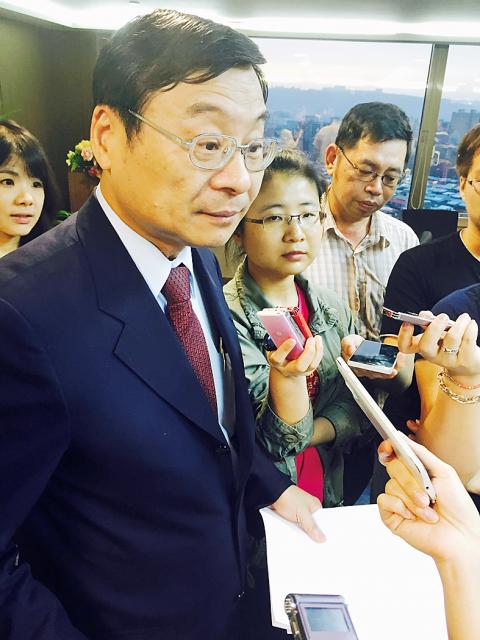Advanced Semiconductor Engineering Inc (ASE, 日月光半導體) yesterday said it has bought 25 percent shares of rival Siliconware Precision Industries Co (SPIL, 矽品精密) as planned in a takeover bid worth NT$35 billion (US$1.06 billion).
The purchase poses a risk to SPIL’s management team, but SPIL said it hopes ASE will keep its promise to stay out of SPIL’s operations.
SPIL also said it plans to continue with its plans to swap shares with Hon Hai Precision Industry Co (鴻海精密).

Photo: Wang Meng-lun, Taipei Times
However, ASE’s hostile takeover bid is likely to trigger a new round of fighting between ASE and Hon Hai at an extraordinary meeting of SPIL shareholders scheduled for Oct. 15.
ASE said in a statement that investors tendered almost 1.15 billion shares in SPIL over its NT$45 per share offer for 779 million shares.
While 36.83 percent of SPIL shares were tendered, ASE said it had capped its acquisition at its planned 25 percent.
“SPIL will face a critical vote during the shareholders’ meeting, as the company management is likely to try every effort to win shareholders’ approval for the proposal to form a partnership with Hon Hai via a share swap,” First Capital Management Inc (第一金證券投顧) said.
The proposed alliance would make Hon Hai, with a 21.24 percent stake, SPIL’s biggest shareholder.
The share swap plan requires 50 percent of SPIL shareholders to attend next month’s meeting and for 66 percent of the attendees to vote yes.
If the measure is approved, it would reduce ASE’s holding in SPIL to about 19 percent.
First Capital said ASE was certain to seek a no vote in the meeting to stifle the planned alliance, but it would need to gain about one-third of shareholders’ proxies to vote against SPIL management’s position.
That could prompt Hon Hai to make a tender offer to SPIL in order to safeguard its interest and avoid a potential debacle, the brokerage said.
Hon Hai chairman Terry Gou (郭台銘) yesterday said he does not think ASE’s purchase would create synergy between ASE and SPIL because there is too much overlap in their client lists.
“The two companies have an overlap of more than 85 percent in their clients,” Gou said.
“What if the two companies jointly raise the prices in the market? What if they decide not to supply products to specific clients? I do not think their clients will accept it,” he said.
However, if ASE’s acquisition is simply a financial investment and will not interfere with SPIL’s management, Gou said he would welcome ASE to be a “happy investor” in SPIL.
The Financial Supervisory Commission said that it has no opinion on the matter, as public tender offers are a free-market mechanism.
Barring violations such as insider trading and failure in meeting procedural requirements, “whether it is a poison pill or a golden parachute, these tactics are quite common in mature markets,” commission Chairman William Tseng (曾銘宗) said.
Tseng said consolidation could be beneficial for certain industries to create synergistic gains where “one plus one may be greater than two.”
Additional reporting by Lauly Li and Ted Chen

EUROPEAN TARGETS: The planned Munich center would support TSMC’s European customers to design high-performance, energy-efficient chips, an executive said Taiwan Semiconductor Manufacturing Co (TSMC, 台積電), the world’s largest contract chipmaker, yesterday said that it plans to launch a new research-and-development (R&D) center in Munich, Germany, next quarter to assist customers with chip design. TSMC Europe president Paul de Bot made the announcement during a technology symposium in Amsterdam on Tuesday, the chipmaker said. The new Munich center would be the firm’s first chip designing center in Europe, it said. The chipmaker has set up a major R&D center at its base of operations in Hsinchu and plans to create a new one in the US to provide services for major US customers,

The Ministry of Transportation and Communications yesterday said that it would redesign the written portion of the driver’s license exam to make it more rigorous. “We hope that the exam can assess drivers’ understanding of traffic rules, particularly those who take the driver’s license test for the first time. In the past, drivers only needed to cram a book of test questions to pass the written exam,” Minister of Transportation and Communications Chen Shih-kai (陳世凱) told a news conference at the Taoyuan Motor Vehicle Office. “In the future, they would not be able to pass the test unless they study traffic regulations

GAINING STEAM: The scheme initially failed to gather much attention, with only 188 cards issued in its first year, but gained popularity amid the COVID-19 pandemic Applications for the Employment Gold Card have increased in the past few years, with the card having been issued to a total of 13,191 people from 101 countries since its introduction in 2018, the National Development Council (NDC) said yesterday. Those who have received the card have included celebrities, such as former NBA star Dwight Howard and Australian-South Korean cheerleader Dahye Lee, the NDC said. The four-in-one Employment Gold Card combines a work permit, resident visa, Alien Resident Certificate (ARC) and re-entry permit. It was first introduced in February 2018 through the Act Governing Recruitment and Employment of Foreign Professionals (外國專業人才延攬及雇用法),

‘A SURVIVAL QUESTION’: US officials have been urging the opposition KMT and TPP not to block defense spending, especially the special defense budget, an official said The US plans to ramp up weapons sales to Taiwan to a level exceeding US President Donald Trump’s first term as part of an effort to deter China as it intensifies military pressure on the nation, two US officials said on condition of anonymity. If US arms sales do accelerate, it could ease worries about the extent of Trump’s commitment to Taiwan. It would also add new friction to the tense US-China relationship. The officials said they expect US approvals for weapons sales to Taiwan over the next four years to surpass those in Trump’s first term, with one of them saying